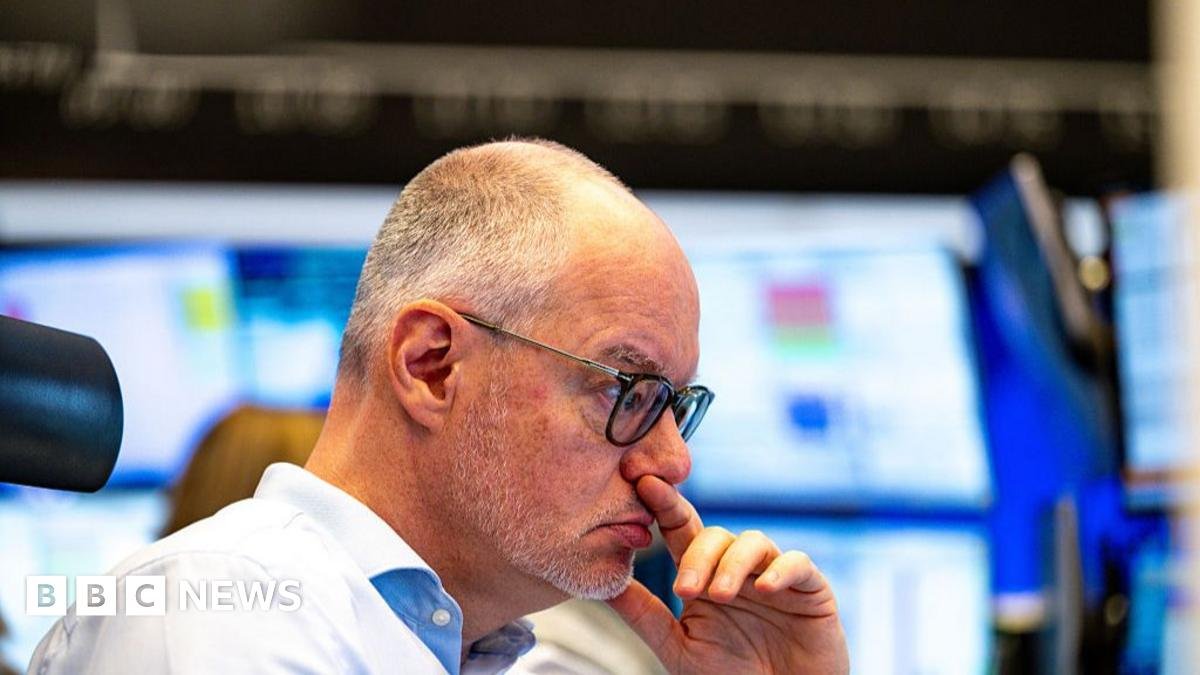EU Pauses Counter-Tariffs Against US
BBC News
This video can not be played
The EU puts retaliatory tariffs against the US on hold, after Donald Trump pauses tariff hikes for 90 days
His universal 10% levy for all countries, except China, remains in place – as does the 25% rate for all aluminium, steel, and cars entering the US
The trade war between Beijing and Washington deepens, as Trump imposes 125% tariffs on Chinese goods and China retaliates with 84% levies
Financial markets in Asia and Europe make gains, with one short seller telling the BBC he's "happy" with his returns on the recent turmoil
"What a day, but more great days coming," Trump says early on Thursday. Our North America correspondent analyses his retreat from an all-out global trade war
As part of Your Voice Your BBC News, we're answering your questions on tariffs at 12:30 BST – you can get in touch on WhatsApp: +44 7756 165803
This video can not be played
'They were getting yippy', Trump says on 90-day tariffs pause
Edited by Rorey Bosotti and Adam Durbin
Donald Trump abandoned his tariff board yesterday when he adopted a 90-day pause
With the EU and Donald Trump now in a 90-day holding pattern over tariff measures – more on that in our posts below – here's the state of play on the import taxes currently in place:
US vs China
As it stands, the US has a 125% tariff on goods from China, while Beijing has set tariffs of 84% on US imports.
Steel and aluminium
Tariffs of 25% are in place on all aluminium and steel exported to the US – that has been the case since mid-March.
Cars and car parts
Since 3 April, there have also been 25% tariffs in place on the importing of foreign cars into the US.
From 2 May, this is set to also include car parts.
Separate 10% tariffs
A slate of separate 10% tariffs on all imports into the US replaced a varied list of figures – including those who Trump termed the ‘worst offenders’ – for 90 days after Trump announced a pause for countries yesterday.
But this rate does not apply to Canada and Mexico, who are key trading partners of the US.
As we just reported, the European Union has announced a pause on counter measures against the United States on import taxes into the bloc.
We can now bring you a bit more insight into the measures the EU had planned to take to counter those tariffs.
Twenty-six EU member states – which is everyone bar Hungary – voted to impose the countermeasures just hours before Trump announced his 90-day pause on implementing the tariffs yesterday.
Under the European Commission’s plans, the retaliatory measures would be introduced in three phases starting on 15 April – with €3.9bn ($4.3bn) worth of stuff the US sells to EU countries affected.
A month later, on 15 May another €13.5bn ($14.9bn) of goods was scheduled to be impacted, followed by a further €3.5bn ($3.8bn) from 1 December.
These tariffs were in response to the 25% import taxes President Trump imposed on all steel and aluminium and came into force in mid-March. They applied to both the EU and the rest of the world.
The European Union says it is pausing its countermeasures on President Trump's tariffs for 90 days.
In a statement, European Commission President Ursula von der Leyen says that the EU wants "to give negotiations a chance" after Trump announced yesterday that there would be a 90 day pause for nations hit by higher US import tariffs.
Simon Harris, Ireland's deputy prime minister, says negotiations with the US are “likely” after his meeting with the US commerce secretary yesterday.
"It has been my consistent position and the consistent position of the Irish government and the European Union that we need to get into substantive, calm, measured dialogue with the United States,” Harris says.
He adds “it has always been our preference that would have happened before tariff announcements. Clearly that was not the position of the United States".
The European Union – which Trump considers one of the "worst offenders" – had been due to receive customised tariffs of 20%.
In response, the EU approved a first set of retaliatory tariffs against the US, due to take effect on 15 April.
But Trump's most recent announcement set a baseline tariff of 10% on all imports from the 27-member European Union – including Ireland.
Mitchell Labiak
Business reporter
Not everyone loses out when share prices fall.
Some traders are short sellers who borrow stocks and immediately sell them. If the value goes down, they buy them back cheaper and pocket the difference.
It's not a typical investment strategy – and comes with a big slice of risk – but has paid off for some.
Fraser Perring, a short seller from Viceroy Research, remembers Trump's 'Liberation Day' announcement well.
"My phone started blowing up when he [Trump] held up the bingo card," Perring says. "The amount of messages I had coming through saying 'WTF – this is great for us'."
Perring won't disclose how much he has made since cashing in his shorts.
"But we're happy. One man's manure is another man's money."
Mitchell Labiak
Business reporter
European traders – and anyone with a pension invested in European stocks – will likely be breathing a sigh of relief today as markets rebounded across the continent.
However, it is important to put those rises in context – with the FTSE, Dax, Cac 40, and Ibex 35 all down from their pre “Liberation Day” highs.
Over the month to today, the four big indexes are all down between 5% and 10%. Adam Goldsmith
Adam Goldsmith
Live reporter
Was Donald Trump referring to the notorious golf 'yips' when he blamed 'yippy' countries for the pause in tariffs?
When Donald Trump explained why he had put a 90-day pause on his sweeping tariff scheme, he told reporters that it was because countries had started to get "yippy".
But what exactly did the president mean by this; was the keen golfer referring to the so-called yips that so often hinder a clean putt? Or something else entirely?
Dr Robbie Love, a senior lecturer in English Language and Linguistics at Aston University, tells me that "yip" can be traced back as far as the 1400s, where there is evidence of it being used to refer to the cheeping sound of a newly hatched bird.
But, by the 20th Century this had been adapted to refer to "high-pitched barking of small dogs" and also "any kind of short, high-pitched cry, including those made by people", Love explains.
"The adjective ‘yippy’ seems to be derived from this sense – describing [in this case in humans] a quality of excitable/anxious [and also perhaps annoying] yelping, like a dog."
The expert, though, stresses that he can't be sure whether this is exactly what Trump intended to imply when he addressed reporters outside the White House.
"He may have meant that he'd been inundated with communications about the tariffs, and/or perhaps he meant something closer to 'skittish'", Love observes.
"Or perhaps it reveals something about how he regards the leaders of other countries." Rachel Flynn
Rachel Flynn
Live reporter
Morning hasn't broken just yet in Washington DC, but the world is still reacting to yesterday's tariff U-turn.
Donald Trump announced a 90-day pause for nations hit by higher US tariffs, while raising tariffs on goods from China to 125%.
Here's what's happened so far on Thursday:
Another day, another change to Trump's tariff policy.
A lot has happened in the last 24 hours – which we've summarised here. Those updates have created even more questions – which our correspondents will be answering live at 12:30 BST.
You can follow along by pressing watch live at the top of this page.
Do you have a question?
Please read our terms & conditions and privacy policy
Stock markets in Asia have closed for the day, and there is some relief for traders there.
Stock markets in India were closed for a public holiday today.
Former assistant US trade representative for China affairs under Barack Obama's administration, Jeff Moon, says "the laws of economics" will stop Trump achieving what he is promising will come after tariffs.
"Even if someone wanted to move a factory back to the US, that takes years. That's not something you can snap your fingers and have right away," Moon tells BBC Radio 5 Live.
He mentions some products, like iPhones, are supplied by a "complex ecosystem in China" so can't translate to the US quickly.
Trump's attack on Beijing will "stiffen the Chinese spine," Moon says, suggesting if President Xi were to back down "his grip on power would be in jeopardy".
"I'm not optimistic that [any] negotiations will result in very much. We've negotiated with China for decades and not got anywhere…so there is no easy way out of all of this," Moon says.
The trade in goods between the two economic powers added up to around $585bn (£429bn) last year.
The US currently runs a trade deficit with China: last year, the US imported far more from China ($440bn) than China imported from America ($145bn).
In his first term as president, Trump imposed significant tariffs on China, which were kept in place and added to by his successor Joe Biden.
Together those trade barriers helped to bring the goods the US imported from China down from a 21% share of America's total imports in 2016 to 13% last year.
This means US reliance on China for trade has diminished over the past decade – though analysts point out that some Chinese goods exports to the US have been re-routed through south-east Asian countries.
You can read more on what a US-China trade war could do to the world economy.
Mitchell Labiak
Business reporter
The FTSE 100 has jumped this morning following President Trump's reversal with green across the board.
Some firms have had a better morning than others, and some have had a pretty bad morning.
The biggest winner is Barclays which leapt 30% on opening though has since settled down to 14%. JD Sports and Rolls Royce were up 11% and 10% respectively.
Despite the bumps elsewhere, it was a bad day for UK supermarkets. In its results this morning, Tesco referenced a price war between them. Its shares fell 6% while its rival Sainsbury's fell 4.8% and Marks & Spencer dropped 2.6%.
China's Foreign Ministry Spokesperson Lin Jian says China's response to US tariffs "will continue to the end" and Beijing will not let the "interests of Chinese people be deprived, or the trading system be undermined".
He says the US is acting out of "selfish interests" and is using tariffs as a weapon to exert maximum pressure and "seek selfish gains".
"This undermines the rules-based trade system and destabilises global economic order," he continues.
"This move is against the whole world," he says, adding that it will "end in failure" and that the US is putting its own interests over those of the international community.
The home secretary is asked whether the last 24 hours have put her off being able to rely on the US as a trading partner.
Cooper replies saying it actually reinforces that the government needs to continue what it's doing.
She mentions supporting British industry, getting investment – mentioning the Bedfordshire Universal Studios theme park announcement yesterday – and being a "stable place" for investors to come to and "continue to support key industries".
The Bedfordshire Universal Studios theme park, due to open in 2031, is expected to feature rides based on Paddington
Cooper goes on to say the British government will continue to negotiate on tariffs, adding that their position is "we should be reducing barriers to trade".
The government wants to see trade barriers reduced both for the UK and around the world, which is what the trade secretary is doing, she says.
“Businesses want to know the UK government is acting in their interest,” Cooper adds.
Cooper says that global instability will "continue for some time", but stresses that she doesn't want to see a global trade war.
As a result, the home secretary says that the government's position will remain the same; keeping a steady approach and negotiating to the benefit of the UK.
We're just about to hear from UK Home Secretary Yvette Cooper, who we expect to be questioned on tariffs on Radio 4's Today programme.
The UK is facing a 10% charge on exported goods to the US, though Prime Minister Keir Starmer suggests that he is hoping to reach an agreement with the US to limit the impact of tariffs.
We'll bring you what Cooper has to say here as soon as we get it, and you can listen to the interview live here.
For countries on Donald Trump’s so-called worst offenders list, there was a sigh of relief when tariffs were downgraded to 10% suddenly last night.
Here's how some of the world’s leaders have reacted to the 90-day pause so far:
 Michael Race
Michael Race
Senior economics and business reporter
Things are looking a lot more rosy for investors on Europe's main stock markets so far this morning.
In the UK, FTSE 100 is already up 6%.
In France, the Cac 40 is up 6.3%.
And in Germany the Dax is up 8%,
All three indexes had closed before Trump decided to pause some higher tariffs for 90 days yesterday, so we'll be watching closely how trading fairs today on this side of the Atlantic.
Watch all the highlights on iPlayer
Hannah and Dara's diamond throwdown
Revenge, from a unique perspective
What happens if Banksy paints your wall?
Copyright © 2025 BBC. The BBC is not responsible for the content of external sites. Read about our approach to external linking.



